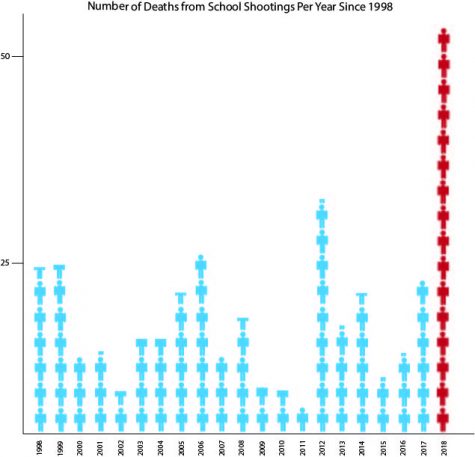Lockdown drills do not prepare students for emergencies

“I love you, Mom.” According to Minnesota Public Radio, that was the text that an eighth grader sent to her mother, April Sullivan during a lockdown last May in Virginia. Sullivan explained that her daughter did not understand that “code blue” was a drill. As the girl hid in the corner with her classmate, she believed that she was hiding from a dangerous intruder, and this message could be her last words to her mother.
School shootings have begun to feel more and more common, as the news fills with coverage of tragic events across the country. The issue has gained even more traction since the Parkland shooting in February of 2018.
Despite how it may appear, according to the Washington Post, school shootings have actually decreased since the 1990s. This information calls into question the need for lockdowns that are so common in schools. According to NBC, there have been 38 school shootings in the US since 2013. However, while the frequency of school shootings is decreasing, the fatalities are increasing, with 55 people dying in gun related incidents within schools in 2018, according to the Post Naval Graduate School.
According to The Conversation, the problem with the system is that 91% of shooters are current or former students of the school in question, who are familiar with the school’s lockdown practices. So really, all that these drills are doing is helping potential perpetrators find the holes in the system.
The attitude of students towards lockdown drills tends to be dismissive and mocking. When the lockdown drill alarm sounds, students seem annoyed at being disrupted from their studies, and when seated, many end up taking out their phones to pass the time, whispering with their classmates rather than staying quiet.
Is this reaction because students don’t take the drills seriously enough, or is it rather a reaction to the scary and uncomfortable idea of having a true emergency during school? Often times, the message that plays over the phones at SPA takes a while to announce whether a drill is being conducted or if it is a true emergency.
Lockdown drills do not provide the service intended. Instead of leaving students prepared for an emergency situation, they leave students terrified for their safety in schools, despite the very slim chance of anything actually happening.
Maren Ostrem is the Managing Editor for The Rubicon. This is her fourth year on staff. During this social distancing period, Maren has been snuggling with...
Kat St. Martin-Norburg is a senior and is excited for her third year on staff. This year she is the Opinions Editor and looks forward to taking the Opinions...